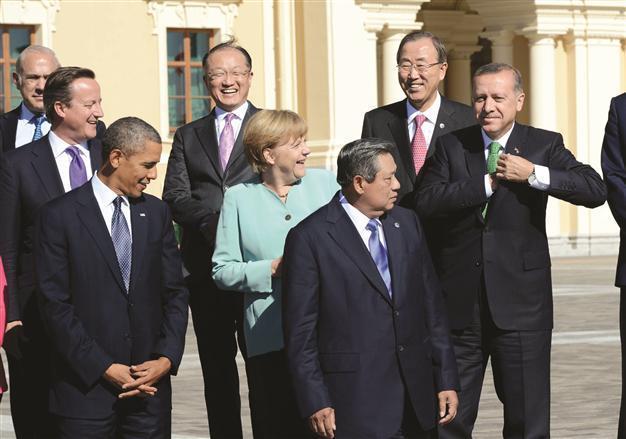US in last preparations for ‘Operation Syria’
ST PETERSBURG

Turkish PM Erdoğan puts a Turkish flag marking his spot in his pocket at a family picture as the other G-20 leaders in Russia smile at his move.
Washington and Ankara are preparing for an armed intervention into war-torn Syria, with U.S. officials tightening security at diplomatic missions in Turkey and Lebanon and Prime Minister Recep Tayyip Erdoğan saying opposition militants were awaiting air support from “allies.”“Leaders have carefully watched the massacre the Syrian regime carried out on its people, and they accept the extreme necessity of an operation against Syria,” Erdoğan told reporters after a G-20 summit in St. Petersburg. “They asked ‘what will happen when al-Assad falls?’ What can be crueler than the leader who bombs his own people? An administration that was elected by the will of the people will not be bad as this one is,” Erdoğan said, in an apparent reference to world powers’ concerns about jihadists fighting in the country.
“At the moment, there is no such thing as a decision for a joint operation but it can be done with a coalition composed of countries. It could be three countries, five countries. What will be the strategy of such an operation, what will be the tactics – those are separate issues,” Erdoğan said, adding that rebels were urgently seeking air support from outsiders. “There is no problem on land. The rebels’ biggest expectation is air support. If this is given, they would advance at a quicker pace.”
U.S. President Barack Obama said he would address the nation about Syria on Sept. 10 as he seeks public and congressional authority for military action against the Syrian government.
Failing to answer chemical weapons use would “send a signal to rogue nations,” he said in reference to Damascus’ alleged use of sarin gas on Aug. 21. Obama, however, refused to say what he would do if Congress does not approve Syria strikes.
The United States has lost its hope for a negotiated solution to the crisis with Moscow. Russian President Vladimir Putin said Sept. 6 that he held talks on Syria with Obama on the sidelines of the G-20 summit but confirmed the meeting did not end their differences on the conflict.
“We spoke sitting down ... it was a constructive, meaningful, cordial conversation. Each of us kept his own opinion,” Putin told reporters. On the same day, a White House official said Russia had nothing to add to the political debate on Syria in the U.S.
“I don’t know that the Russians have anything to add to the debate in the United States, given that we know where Russia stands on this issue,” said Ben Rhodes, Obama’s deputy national security adviser for strategic communications.
“They’ve continually supported [President Bashar] al-Assad no matter what the facts show, and no matter what the regime does. So again, on the issue of chemical weapons, we don’t expect to have Russian cooperation,” he said.
A day before, U.S. Ambassador to the United Nations Samantha Power said the U.S. had given up trying to work with the U.N. Security Council on Syria, accusing Russia of holding the council hostage and allowing Moscow’s allies in Syria to deploy poison gas against innocent children.
“In the wake of the flagrant shattering of the international norm against chemical weapons use, Russia continues to hold the council hostage and shirk its international responsibilities, including as a party to the chemical weapons convention,” Power said.
“Our considered view, after months of efforts on chemical weapons and after 2.5 years of efforts on Geneva [peace talks] … is that there is no viable path forward in this Security Council,” she added.
Meanwhile, the U.S. has begun evacuating non-essential staff from its Beirut embassy, urging Americans to avoid all travel to Lebanon and defer trips to southern Turkey. “The Department of State has ordered a drawdown of non-emergency U.S. government personnel and family members in Beirut, Lebanon, and approved the drawdown of non-emergency personnel and family members who wish to leave Adana, Turkey,” deputy State spokeswoman Marie Harf said.
Harf warned any U.S. citizens who chose to remain in Lebanon or southern Turkey that they “should limit nonessential travel within the country, be aware of their surroundings whether in their residences or moving about, make their own contingency emergency plans.”
















